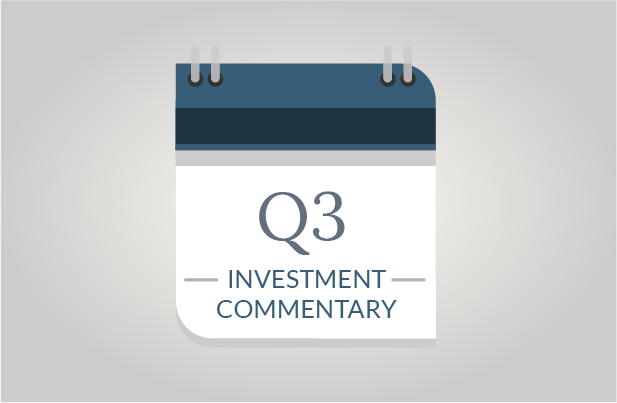- Stocks and bonds fell to new 2022 investment lows during the third quarter, including new historic lows for bonds.
- High inflation persists, but the growth of inflation modestly declined over the summer.
- The Fed remains committed to combatting inflation, with further Fed rate increases being almost certain.
Continued Market Declines
Sharp market declines persisted in the third quarter as both stocks and bonds touched new lows for the year. Third quarter broad investment market returns were down double digits across all major market segments. Stocks reentered bear market territory marked by a 20% or greater decline. Bonds posted historic percentage declines. A summary of 2022 broad market performance as of September 30th is as follows:
Bloomberg U.S. Aggregate (U.S. bonds) -14.6%
S&P 500 Index (large U.S. stocks) -24.8%
Nasdaq (largely tech & growth stocks) -32.0%
Russell 2000 (small U.S. stocks) -25.1%
MSCI All Country World Index ex-US -26.5%
(International Stocks)
This has been a very atypical year where both bonds and stocks are down, generating significant losses for aggressive and conservative investors alike.
Wide market declines have investors concerned. Here we discuss many questions that investors are asking, offering answers along with our long-term thoughts based upon current and historical data.
Why Are the Investment Markets Down?
It is reasonable to wonder why stocks are experiencing such heavy declines when the economy remains strong. Logically, it might not make any sense. However, the strong economy is driving inflation, and high inflation is a large part of the problem.
The prices of both stocks and bonds are based upon forward looking investment expectations. Inflation is casting concerns about a looming recession. The Federal Reserve Board (Fed) and other global central banks are actively raising rates in hopes of lowering inflation, but their aggressive approach is also creating concern about triggering a recession.
While central banks can impact some aspects of the economy and inflation, there are elements beyond their control. Primary examples include the war in Ukraine and slowing growth in China post extensive COVID lockdowns.
Another factor impacting stock prices is rising interest rates which detract from stock price valuations. Stocks compete against bonds and other income paying investments such as CDs. Higher interest income on Treasuries, CDs and other investments creates investment competition for stocks (meaning fewer buyers of stocks). Higher interest rates also make corporate borrowing more expensive, and negatively affect discounted cash flow analysis used to determine stock price valuations.
Bonds are also suffering significant and historic declines this year as interest rates are rising. Treasury yields have moved at warp speed, rising to levels that we haven’t seen in more than a decade. It can be confusing to understand why bond prices fall while interest rates rise as bonds are now paying more yield. Yes, higher yields (interest rates) make new bond purchases more attractive, but they hurt the prices of older bonds paying lower interest rates. Those lower rates are unattractive in comparison.
Will Things Get Worse?
It is hard to say if market declines will continue or if we are close to a market turnaround. All eyes are on inflation, which is a primary driver of market performance this year.
Many economists thought inflation would peak by August. Inflation has declined in recent months, but it remains stubbornly high. High inflation has prompted aggressive action by the Fed, which has raised the Federal Funds rate by 3% this year. September’s three-quarters of a percent Fed rate increase was followed by a 7% decline in the S&P 500 over the next 8 trading days. World central banks have taken similar actions.
Further Fed rate hikes are almost inevitable as the Fed remains hawkish, saying it will do “whatever it takes” to lower inflation. While many investors are blaming the Fed for the weak markets, the board is battling an inflation monster created mostly from fiscal stimulus, pandemic lockdowns, and supply chain woes. We shouldn’t expect to see inflation relief or perhaps investment market recovery until the consumer cuts back, which is what the Fed wants us to do.
Continued aggressive rate hikes by the Fed might not bode well for stocks or bonds. However, this is not a foregone conclusion. We have seen periods this year where stocks and bonds rallied post Fed rate hikes on the hopes that Fed actions will take hold in taming inflation. Once Fed rate increases are believed to have drawn inflation close to a tipping point, interest rates could retreat, and stock prices could recover.
What Is Inflation Showing Now?
All eyes remain on inflation as an indicator of where the markets are headed. Inflation modestly declined in recent months. This is a positive directional trend, but declines have been slow moving.
Fortunately, prices appear to be declining in some parts of the economy. Housing prices posted their first monthly decline in July, brent crude prices have fallen by more than 20%, and both airline and hotel prices are down. The next formal inflation figures will be released in mid-October. We are hoping the recent downward trend of inflation declines will continue. However, rising food prices and reports of strong consumer spending could keep inflation elevated. Ultimately, inflation will stunt consumer demand. The question is only when, not if.
Does It Make Sense to Stay Invested?
We can never predict how the investment markets will perform. Making such predictions would be market timing, which has proven to be nearly impossible and extremely dangerous to potential investment performance. While we can’t make any predictions, we can look to history and current market tea leaves.
Yes, the markets could move lower, but history provides a far more positive outlook. Numerous market downturns and recessions have occurred over the last century. Despite periods of significant downturns, the good times have far outpaced the bad times. Looking back to 1926, approximately 75% of the years rendered positive U.S. total stock market returns. Since the mid 70’s, stock returns have exceeded 11% and bond returns were in the 6% range. These returns were achieved despite several down markets along the way. Bottom line, the bull markets have significantly outpaced the bear markets.
A historical look at the economy over time offers similar results. Economic expansions have been far more robust and longer relative to periods of recession. Furthermore, the investment markets typically recover well in advance of an economic recovery. Hence, if we do move into a recession, investments could recover much sooner than the economy does.
Our Approach
Recognizing the points above, we remain committed to a long-term investment approach. We have been making portfolio adjustments as we see appropriate including buying on stock market dips, making bonds more defensive, and repositioning to capture tax opportunities. However, we are not inclined to sell or retreat from investments that would convert current paper losses into permanent losses.
We know market downturns generate financial anxiety. We invite you to contact us to discuss your investments and finances in greater detail.
SageVest Wealth Management




